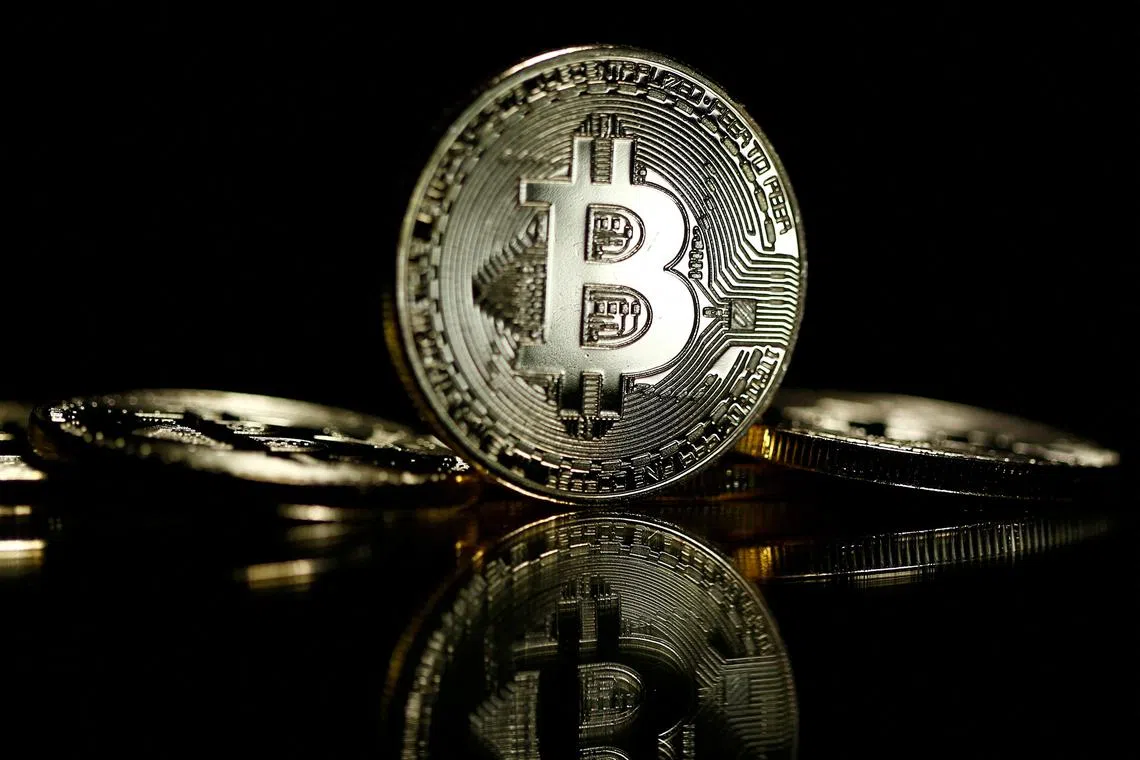Scam victim’s $10,001 used to buy Bitcoin; High Court rules crypto seller gets the money
Sign up now: Get ST's newsletters delivered to your inbox

The High Court found that there were two victims in the case - the scam victim and the man who sold his cryptocurrency.
PHOTO ILLUSTRATION: REUTERS
Follow topic:
SINGAPORE - A man who unknowingly sold his Bitcoin to a scammer was allowed to keep the money for now, even though the $10,001 used to transact the deal had come from the victim of a fraudulent bank transfer.
A High Court judge found that there were two victims in the case – the man whose stolen funds were used by the scammer to buy the Bitcoin, and the man who sold his cryptocurrency.
A court fight had ensued between the seller and the bank transfer victim after the money was seized in the course of police investigations. Each had claimed the money should be returned to him.
In a written judgment last Friday, Justice Aedit Abdullah ruled that both men had lawful possession of the money.
On the one hand, the money originated from the bank account of Mr Ling Kok Hua and was fraudulently transferred. On the other hand, Mr William Lim Tien Hou had received the money in a legitimate contractual transaction.
He ruled that the money should be returned to the individual it was seized from, which is Mr Lim.
The judge said: “I understand that both parties have been put to expense and time in dealing with the aftermath of a fraud that neither was implicated in, and which both were victims of.”
He noted that his decision was on the basis of provisions in the Criminal Procedure Code governing the return of seized property, and has no effect on a civil court if parties start a separate civil action to assert their rights.
“However, I would urge the parties to see if they can come to some sort of resolution between themselves that would avoid further time and expense for both.”
On Nov 10, 2018, a user named “haylieelan” on localbitcoins.com contacted Mr Lim – who had placed an advertisement to sell Bitcoin on the peer-to-peer trading platform – for a Bitcoin trade worth $10,000.
After Mr Lim asked “haylieelan” to provide a photograph and identity details, the user submitted a photo of Mr Ling holding his identity card and a note stating that he was buying Bitcoin from “cryptotil”, which was Mr Lim’s username.
Mr Lim received $10,000 in his bank account and released the Bitcoin to “haylieelan”. Later in the day, he received another $1 but had no idea what it was for.
On the same day, Mr Ling was duped into believing that he was communicating with his former supervisor on Facebook when, in fact, he was speaking with a scammer who had hacked the account.
Mr Ling agreed to help transfer funds to a Bitcoin trading account, which turned out to be Mr Lim’s.
Thinking that he was helping his former boss, Mr Ling provided his online banking credentials and allowed the scammer remote access to his bank account via the TeamViewer application.
Mr Ling first prepared a transfer of $1 to Mr Lim’s bank account.
At the same time, the scammer asked Mr Ling to provide a photograph showing his identity card details and a piece of paper stating that he was buying Bitcoin from “cryptotil”. Mr Ling complied.
Shortly after, the scammer asked Mr Ling to provide proof of address. He complied by taking a photograph of a letter which contained his address.
While Mr Ling was taking the two photographs, the scammer altered the sum of $1 to $10,000 and effected the transfer. Mr Ling realised this only after the transfer had gone through.
The scammer asked Mr Ling to make a further transfer of $1, and tried to alter the sum to $30,000, but Mr Ling corrected it back to $1 before effecting the transfer.
Mr Ling made a police report. Upon the conclusion of police investigations, Mr Lim and Mr Ling indicated that they would be laying competing claims on the seized money.
A disposal inquiry was held to determine how the money should be distributed.
In 2021, a district judge ruled that the sum should be returned to Mr Ling.
The district judge said Mr Lim appreciated the risks associated with Bitcoin trades, and that while he conducted due diligence checks, the money remained tainted by criminality.
Mr Lim then appealed to the High Court.
Justice Abdullah reversed the Lower Court’s decision, saying that it was immaterial whether the possession of the asset came through a risky transaction.


